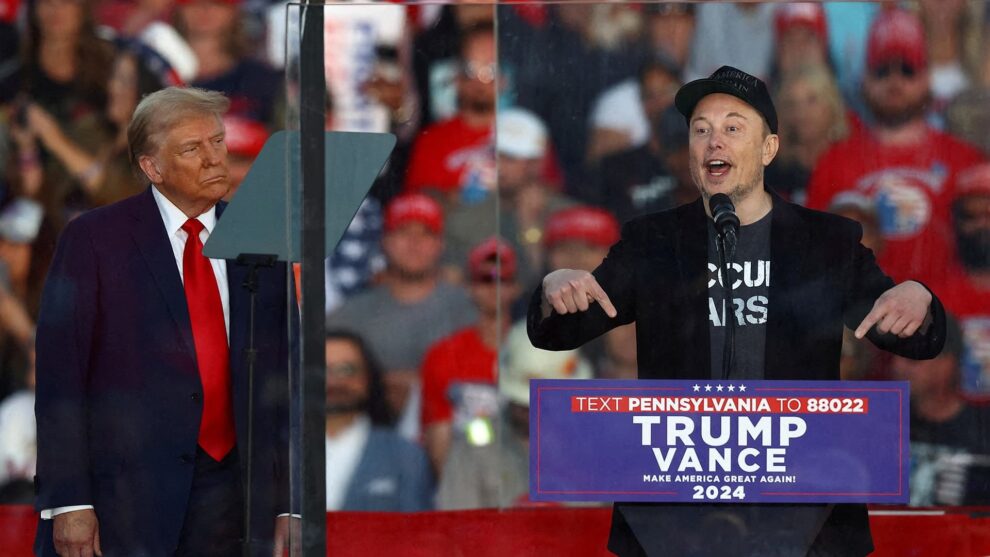Silicon Valley’s venture capital community is expressing unprecedented optimism about a potential technological renaissance, largely centered around expectations of reduced regulation and the prospective involvement of Elon Musk in the incoming administration. This optimistic outlook marks a significant shift in the tech industry’s traditional stance toward Trump, with many investors and executives now focusing on the potential for accelerated innovation and economic growth.
The enthusiasm stems largely from reports that Trump is considering Musk for key White House roles, including the possibility of auditing federal programs and organizations. Musk’s proposed “Department of Government Efficiency” – playfully dubbed DOGE – has captured the imagination of tech industry leaders who see it as a potential catalyst for removing bureaucratic barriers that have historically slowed merger and acquisition activities in the sector.
Ben Narasin, founder and general partner at Tenacity Venture Capital, articulates the prevailing sentiment, comparing Musk’s potential impact to “taking a chainsaw through calcified butter.” This colorful metaphor reflects a broader industry hope that Musk’s involvement could lead to fundamental changes in how the government interacts with the tech sector. The enthusiasm crosses political lines, with even some Harris supporters, including Box CEO Aaron Levie, expressing excitement about the potential for reduced regulatory barriers.
The tech industry’s optimism is rooted in specific grievances about the regulatory environment under the Biden administration. Under Biden, the Federal Trade Commission, led by Lina Khan, has taken an aggressive stance toward tech mergers and acquisitions. This approach has significantly impacted major players like Google, which recently abandoned potential acquisitions, including a notable deal with cybersecurity startup Wiz. Similarly, Microsoft and Nvidia have faced increased scrutiny over their AI-related activities.
The cryptocurrency sector, which has long complained about unclear regulatory frameworks under Biden, sees particular promise in the incoming administration. Many crypto-focused VCs and founders had actively supported Trump and Republican candidates, viewing them as more favorable to digital currency innovation. This support reflects a broader belief that reduced regulation could unlock new possibilities in emerging technologies.
However, the situation is not without complexity. JD Vance, the Vice President-elect and former venture capitalist, has previously expressed support for Khan’s antitrust enforcement efforts against Big Tech companies. This stance, coupled with the Trump administration’s previous antitrust investigations into companies like Amazon, Google, and Meta, suggests that the regulatory landscape might be more nuanced than some optimists expect.)
The potential economic implications of these changes are significant. The stock market’s positive response to Trump’s victory has encouraged venture capitalists who have struggled with limited investment options due to high interest rates and few exit opportunities. Many in the industry believe that regulatory relief could reinvigorate the startup ecosystem, leading to increased funding and innovation across various sectors.
Augustus Doricko, CEO of cloud-seeding startup Rainmaker, envisions an era of unprecedented technological advancement, predicting developments in areas ranging from new city development to lunar colonization and weather control. This ambitious outlook is shared by investors in space, industrial, and defense sectors, who anticipate increased government investment and attention, particularly given Trump’s previous establishment of the Space Force and his relationship with Musk.
The tech industry’s response to these developments reveals a striking shift in priorities. While many in Silicon Valley have historically been critical of Trump, the prospect of reduced regulation and increased freedom for technological experimentation has led to a reevaluation of positions. This change reflects a broader tension between innovation and regulation that has long characterized the tech sector’s relationship with government oversight.
However, some industry observers caution that enthusiasm should be tempered with realism. The previous Trump administration’s record on tech regulation was mixed, and the complexity of modern technological challenges may require more nuanced approaches than wholesale deregulation. Additionally, the global nature of tech innovation means that domestic policy changes must be considered within an international context.
As Silicon Valley prepares for this potential new era, the industry appears to be prioritizing the promise of innovation and economic growth over previous political reservations. The combination of Trump’s promised deregulation and Musk’s potential influence has created a unique moment of optimism in the tech sector, even among those who might have previously been skeptical of a Trump presidency.
This anticipated transformation of the relationship between government and technology could herald a new chapter in American innovation, though its ultimate impact will depend on how effectively campaign promises and industry hopes translate into practical policy changes. As the tech industry awaits these developments, the consensus seems to be that significant changes are on the horizon, potentially ushering in what some are calling a new golden age of American technological innovation.
















Add Comment